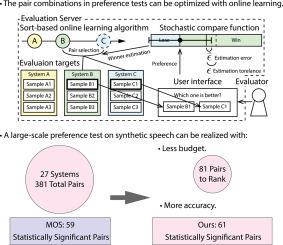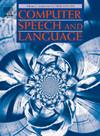Automatic design optimization of preference-based subjective evaluation with online learning in crowdsourcing environment
IF 3.4
3区 计算机科学
Q2 COMPUTER SCIENCE, ARTIFICIAL INTELLIGENCE
引用次数: 0
Abstract
Preference-based subjective evaluation is a key method for reliably evaluating generative media. However, its huge number of pair combinations makes it prohibitively difficult to apply to large-scale evaluation using crowdsourcing. To address this issue, we propose an automatic optimization method for preference-based subjective evaluation in terms of pair combination selections and the allocation of evaluation volumes with online learning in a crowdsourcing environment. We use a preference-based online learning method based on a sorting algorithm to identify the total order of systems with minimum sample volumes. Our online learning algorithm supports parallel and asynchronous executions under fixed-budget conditions required for crowdsourcing. Our experiment on the preference-based subjective evaluation of synthetic speech on naturalness shows that our method successfully optimizes the preference-based test by reducing the number of pair combinations from 351 to 83 and allocating optimal evaluation volumes for each pair ranging from 30 to 663 without compromising evaluation errors and wasting budget allocations.

众包环境下基于偏好的主观评价在线学习自动设计优化
基于偏好的主观评价是可靠评价生成媒体的关键方法。然而,它的大量配对组合使得使用众包进行大规模评估变得非常困难。为了解决这一问题,我们提出了一种基于偏好的主观评价的自动优化方法,包括在众包环境下对组合的选择和评价量的分配。我们使用基于排序算法的基于偏好的在线学习方法来识别具有最小样本体积的系统的总顺序。我们的在线学习算法支持在众包所需的固定预算条件下并行和异步执行。我们对基于偏好的合成语音自然度主观评价的实验表明,我们的方法成功地优化了基于偏好的测试,将配对组合的数量从351个减少到83个,并为每对分配30到663个最优评价量,而不影响评价误差和浪费预算分配。
本文章由计算机程序翻译,如有差异,请以英文原文为准。
求助全文
约1分钟内获得全文
求助全文
来源期刊

Computer Speech and Language
工程技术-计算机:人工智能
CiteScore
11.30
自引率
4.70%
发文量
80
审稿时长
22.9 weeks
期刊介绍:
Computer Speech & Language publishes reports of original research related to the recognition, understanding, production, coding and mining of speech and language.
The speech and language sciences have a long history, but it is only relatively recently that large-scale implementation of and experimentation with complex models of speech and language processing has become feasible. Such research is often carried out somewhat separately by practitioners of artificial intelligence, computer science, electronic engineering, information retrieval, linguistics, phonetics, or psychology.
 求助内容:
求助内容: 应助结果提醒方式:
应助结果提醒方式:


